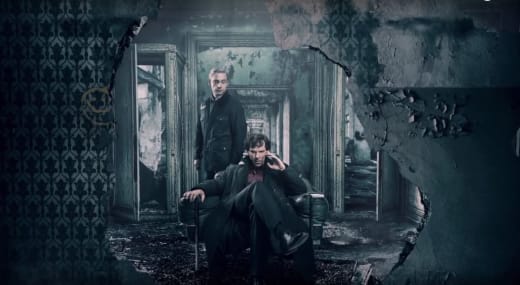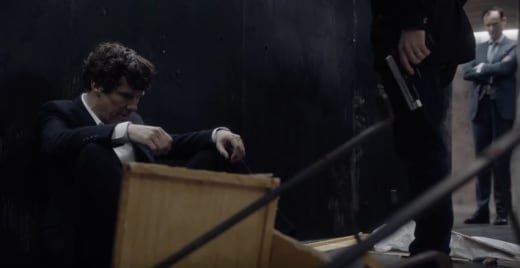Sherlock Review: The Final Problem
 Robin Harry
at
.
Robin Harry
at
.
Well, wow. Sherlock Season 4 Episode 3 was intense. There were a lot of revelations, twists and callbacks, and it was one of the best character studies this show has offered to date. Again, there were fantastic performances from all involved.
That said, Euros' story, or the execution of it, might have been too much for Sherlock's own good. The plot itself left us as many questions as it did answers, which makes it much less satisfying than if it had been a simpler but more compact story.
Let's start with what was great about Sherlock Season 4 Episode 3. This installment was one of the best ones to allow us to dive into who these people are, who they have become. Practically every moment, every scene revealed something about these characters.
We learned that the Holmes family can't just have a conversation, but resorts to experiments on each other to learn the truth about how each other thinks. Sherlock got the truth about Euros from putting Mycroft through a terrifying home-invasion experiment (complete with creepy children and clowns) to learn the truth.
Mycroft: Doctor Watson, why would he do that to me, that was insane!
John: Yes, well, someone convinced him that you wouldn't actually tell the truth unless you were actually wetting yourself.
Mycroft: Someone?
John: Probably me.
Mycroft, no different, revealed that he used the "east wind" tale, not as a method to terrorize his little brother, but as a way to determine whether or not his traumatic memories of Euros were returning. That was his way of figuring out what was going on in Sherlock's brain.
Euros, the Holmes sister, was a complicated soul. She was smarter than both Sherlock and Mycroft, but without the emotional understanding that allowed her to have any ethics or moral compass. So her experiments at Sherrinford were the most revealing, but also the most harrowing.
The first "experiment," where Sherlock was forced to choose which of his companions would shoot the governor, was most telling about Mycroft. While we've always known that Mycroft has a soft spot for Sherlock, he's seemed mostly clinical and cold in his assessment an execution of most things.
I'm not sure if Sherlock chose Mycroft because he thought Mycroft would do it, or because he wanted to protect John from having to do it. That said, it was interesting that Mycroft refused to even touch the gun. He is admittedly one of the most powerful men in England, but even he refuses to wield the power over life and death.
Experiment two had Euros getting the three of them to work together, almost pitting Mycroft and John against each other. Again, the cold and clinical Mycroft was the most emotionally affected, hesitant to compete with John and satisfy Euros' whimsy.
John, on the other hand, embraced the soldier in him, putting his emotions aside for the good of everyone around him. This one further pushed Sherlock to the edge, forcing him to condemn one person to save another two. Sadly, for naught.
Euros' third experiment, however, was the one that broke Sherlock, forcing him to confront both Molly's emotions and whatever it is he feels for her.
This was difficult for Sherlock in all manner of ways. There was the sheer terror on his face when he thought Molly could get killed. There was the pain he felt when he knew he was going to hurt Molly.
I'm not sure if Sherlock realized just how hard it is to say "I love you" when it's true -- until he had to say it. Even when he said it the first time, I'm not even sure he knew it was true for him. That second time, though, he clearly meant it.
Molly: I can't say it because it's true. Sherlock. It's always been true.
Sherlock: Well if it's true then say it anyway.
Molly: You bastard.
Sherlock: Say it anyway.
Molly: You say it first.
Sherlock: What?
Molly: Go on, say it like you mean it.
Sherlock: I - I love you. I love you.
I haven't talked much about Benedict Cumberbatch's performance this season, because, well, he's Benedict Cumberbatch and it's a given that he's amazing. However, I have to say how incredible he was in this scene. The gamut of emotions that ran across his face was nothing short of astounding.
Louise Brealey, though, gave him a run for his money. My heart was breaking for Molly as she struggled with telling this impossible, insensitive, brilliant man how she felt. I loved how she showed that quiet strength it took for Molly to demand that Sherlock said it first.
Of course he loves Molly. She was the one person he trusted when he had to fake his death, she's always the first one he turns to when he and John are on the outs. Whether he loves her more than platonically will be likely be argued for the ages (I think he does), but there was no question that at that moment, what he said was true for him.
That's why he reacted so violently. He was faced with unequivocal truth that Molly Hooper is in love with him, he basically was just confronted with his own feelings for her, he thought she was going to die, and she lived only for him to be taunted by Euros with his emotions.
Mycroft: Sherlock, however hard that was -
Sherlock: Euros, I won. I won. Come on, play fair, the girl on the plane, I need to talk to her. I won, I saved Molly Hooper.
Euros: Saved her? From what? Be sensible, there were no explosives in her little house. Why would I be so clumsy? You didn't win, you lost. Look what you did to her. Look what you did to yourself, all those complicated little emotions, I lost count. Emotional context, it destroys you, every time.
In Euros' fourth experiment, she tried to force Sherlock to choose between Mycroft and John. I knew Mycroft was goading Sherlock and would never let him kill John. Mycroft cares about his brother too much to deny him his best friend.
Everything we knew about Mycroft got deconstructed in this story. The cold, clinical, aloof and apathetic Mycroft Holmes was anything but. He was the one least able to sacrifice a moral code to achieve a goal, the most easily affected by Euros' machinations. What he was, however, was the least self-aware.
Sherlock has had the companionship of John to show him who he is, to allow him to embrace his own emotional context. He has allowed himself to get attached, to make friends.
What we learned, however, was that Sherlock always had that capacity. He had a best friend. Not a dog, like we all thought Redbeard was, but an actual boy. Victor Trevor.
Sherlock: Why don't I remember her?
Mycroft: You do remember her, in a way. Every choice you ever made, every path you ever taken. The man you are today is your memory of Euros.
These were probably the truest words that Mycroft ever spoke. What Euros' story told us is that Sherlock was capable of friendship as a child. He was capable of sharing his space, sharing his life, sharing emotions. Then Euros killed his best friend.
That loss was what changed Sherlock. That's what made him retreat into himself. That's what made him keep people at a distance, repress his emotions. It's also why he wasn't able to come out of that shell until he found a new best friend.
By the end of it all, Sherlock was a well-rounded enough individual to talk his sister down from a proverbial ledge, to play violin to her to comfort her, and to rebuild 221B with ALL of his friends.
Euros, sadly, didn't get nearly enough character development. Sure, she was a Holmes sibling and we learned a lot about her backstory, but when it came down to it, she was just another psychopath.
We only really got to see Euros from Sherlock and Mycroft's eyes. We learned all we did about her from Mycroft's recounting of her story, and from Sherlock's progressive reactions to her games. What we didn't get to see was more of her motivation, her drive, or even that super brain she has.
Okay, now that I've analyzed the characters to death (and believe me, I could do more), let's talk about the actual story. Moriarty, Euros, the whole she-bang.
One of the things I love about Sherlock is how important details are. Watching the show is fun, because you have to think of why everything matters, every missing detail could mean something.
So while I appreciate Euros' story for how it propelled characterization, my goodness, it was a messy sieve of a story.
I mean, really, Euros broke out of a maximum security facility because she got her guards to replace glass panes with paneling? Sherlock Holmes, being of sound mind and judgment (i.e. not high) didn't notice there was no glass? Does he suddenly have no depth perception?
That said, kudos to the lighting design and technical direction crew. They went out of their way to show reflections on the glass panes in every shot of the cell after that. Oh, and I assume that was a different cell they were put in.
Should we just assume she got some brainwashed guards to get her, John and Sherlock off of Sherrinford? And we were just to believe that whenever she closed her eyes, little scared girl on the plane showed up to chat?
I thought from the beginning that the plane wasn't real. How would a young girl be the only survivor on a plane where everyone's dead? If they're all dead, the pathogen must have been airborne, and unless she had bionic lungs, she would have been affected.
How was she even broadcasting from their manor? Who set up audio-visual equipment in a burned-out house enough for John, Sherlock to have earpieces, with a flat-screen TV?
Also, as much as I looooved seeing Andrew Scott on my screen again as Moriarty, are we just to believe that she set Moriarty up to harass Sherlock? I mean, how many plot holes has this episode given the entire series?
I'm willing to suspend disbelief a lot when I watch television. However, I expect more from a show whose hallmark is attention to detail. So many things were simply left to the imagination, when they were actually vital to making this mystery believable.
Even some of the tropes they used were a little exhausting. Sherlock's pirate-Batman jump on the boat made me laugh out loud, as did their mad jump from the Baker Street window during the explosion.
Sherlock: My name's Sherlock Holmes.
Sailor: The detective?
Sherlock: The pirate.
That said, there were a lot of fun call-backs to the series. John wrapped in a blanket, chatting with Sherlock at the end of the ordeal, as Sherlock was at the end of Sherlock Season 1 Episode 1, "A Study In Pink."
When Euros asked Sherlock to play "him," he played the theme that he composed when Irene Adler was gone in Sherlock Season 2 Episode 1, A Scandal in Belgravia. Also from that episode, Vatican Cameos, which Sherlock ignored this time.
The montage at the end of "The Final Problem" really made it feel like a series finale. John and Sherlock rebuilt 221B, and continued solving mysteries together. Baby Rose Watson looked like she was growing up. Mrs. Hudson continued to be exasperated with Sherlock's penchant for shooting and stabbing her home.
We saw Molly Hooper came over, which means that somewhere along the way, that "I-love-you" conversation either got repressed, or dealt with in a good way. Which confuses me even more since we also saw that Sherlock finally texted Irene Adler back.
I suppose it's reasonable to assume that Benedict Cumberbatch and Martin Freeman may never have time to film another series, given how insanely busy they've become. They're both in the Marvel universe now, for crying out loud.
If that's the case, I'm happy with the little glimpse of happily-ever-after that we got.
When all else fails, there are two men sitting, arguing in a scruffy flat, like they've always been there, and they always will. The best and wisest men I have every known. My Baker Street Boys. Sherlock Holmes and Doctor Watson.
Mary
OTHER NOTES:
-
There was just not enough Lestrade this series. Rupert Graves made me so happy whenever he was on screen, and I couldn't stop smiling at his surprise and pleasure yet again when Sherlock remembered his name.
-
How many weapons does Mycroft actually have in that umbrella?
-
I liked all the "Silence of the Lambs" references: staying away from the glass, cannibals in the institution, John Watson in a well.
- My favourite quote is this one from Moriarty. I laughed so hard:
I wrote my own version of the nativity when I was a child. "The Hungry Donkey." It was a bit gory, but if you're gonna put a baby in a manger, you're asking for trouble.
Moriarty
So what did you guys think? So many questions. Let me know in the comments! Also, remember you can always watch Sherlock online.








